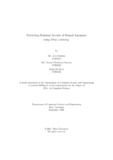| dc.contributor.advisor | Mostakim, Moin | |
| dc.contributor.advisor | Rashid, Warida | |
| dc.contributor.author | Ibrahim, Md. Abu | |
| dc.contributor.author | Nayeem, Md. Nawaz-S-Salekeen | |
| dc.contributor.author | Al Arabi, Sadaf | |
| dc.date.accessioned | 2022-01-12T06:33:19Z | |
| dc.date.available | 2022-01-12T06:33:19Z | |
| dc.date.copyright | 2021 | |
| dc.date.issued | 2021-09 | |
| dc.identifier.other | ID 17301157 | |
| dc.identifier.other | ID 17301082 | |
| dc.identifier.other | ID 17301216 | |
| dc.identifier.uri | http://hdl.handle.net/10361/15872 | |
| dc.description | This thesis is submitted in partial fulfillment of the requirements for the degree of Bachelor of Science in Computer Science and Engineering, 2021. | en_US |
| dc.description | Cataloged from PDF version of thesis. | |
| dc.description | Includes bibliographical references (pages 39-40). | |
| dc.description.abstract | Accent is a huge challenge in communication for all languages. Different people
who speak the same language might pronounce the same word differently. In a
conversation, if two people are from different regions and they have different accents,
we can use our intuition to make sense of what the other person is saying. Sometimes,
even our intuition cannot help determining the meaning of the words because of the
difference in accent. Therefore, it is extremely difficult for an ASR (Automatic
Speech Recognition) system to properly understand the words when the speaker
uses different accent instead of the standard or formal accent as most of the time
the ASR systems are trained on the formal or standard language. Now a days, most
of these issues caused by accents are somewhat worked upon in most used languages
like English, Mandarin and few other languages. However, the ASR systems used
for Bengali Language is still at its infancy and different accents are a major issue.
Finding audio features that differentiate the accents from one another and creating
models to predict the accent using Deep Learning techniques will help to create
a much better ASR System for Bengali Language. This paper will emphasize on
creating few models which can determine the regional accent of Bengali language
given an audio sample. Furthermore, after getting the accuracy of the individual
models we can choose the model which results in the most accuracy. Further work
can be done based on the models to create an ASR System for Bengali language
which will be able to handle few more accents than the standard one. | en_US |
| dc.description.statementofresponsibility | Md. Abu Ibrahim | |
| dc.description.statementofresponsibility | Md. Nawaz-S-Salekeen Nayeem | |
| dc.description.statementofresponsibility | Sadaf Al Arabi | |
| dc.format.extent | 40 pages | |
| dc.language.iso | en | en_US |
| dc.publisher | Brac University | en_US |
| dc.rights | Brac University theses are protected by copyright. They may be viewed from this source for any purpose, but reproduction or distribution in any format is prohibited without written permission. | |
| dc.subject | Deep learning | en_US |
| dc.subject | Bengali accent | en_US |
| dc.subject | Accent prediction | en_US |
| dc.subject | Neural networks | en_US |
| dc.subject | MLP | en_US |
| dc.subject | CNN | en_US |
| dc.subject | RNN | en_US |
| dc.subject | ASR | en_US |
| dc.subject.lcsh | Cognitive learning theory (Deep learning) | |
| dc.subject.lcsh | Artificial intelligence | |
| dc.subject.lcsh | Automatic speech recognition | |
| dc.title | Predicting regional accents of Bengali language using deep learning | en_US |
| dc.type | Thesis | en_US |
| dc.contributor.department | Department of Computer Science and Engineering, Brac University | |
| dc.description.degree | B. Computer Science | |

